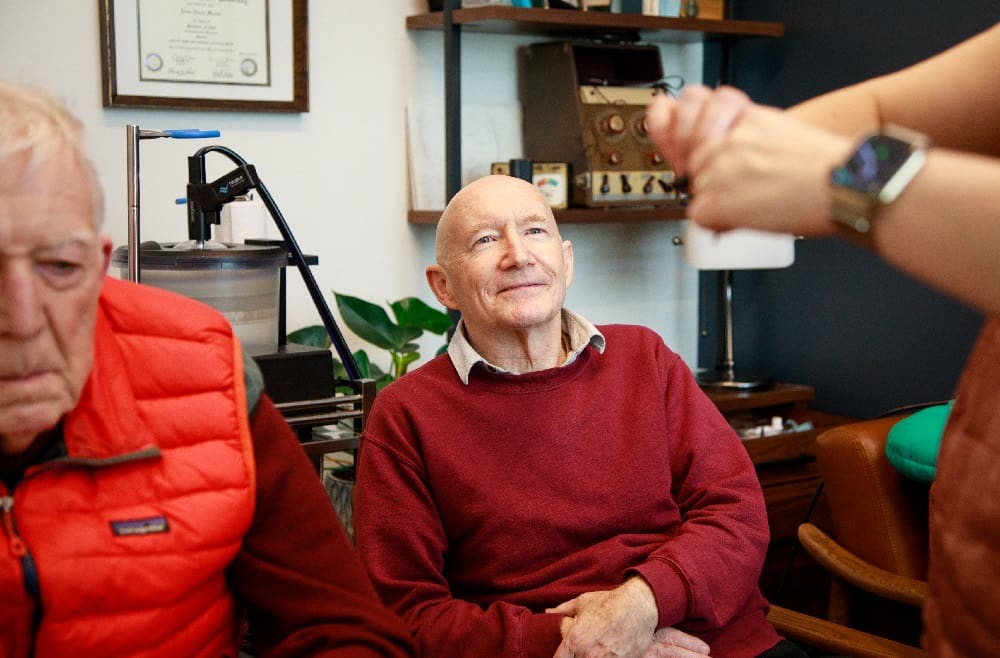
Patient Resources

2025-06-19
Gabriel Liboiron-Cohen, Doctor of Audiology
If you're experiencing a persistent ringing, buzzing, or hissing sound in your ears, particularly when trying to sleep, you might be dealing with tinnitus. Tinnitus at night can be particularly distressing, because the quiet environment when you're trying to wind down amplifies these sounds. Understanding the answer to "Why do my ears ring at night?" involves unpacking the nature of tinnitus itself: a symptom rather than a disease, showing issues in your auditory system or related structures.
Common Causes of Ears Ringing at Night
To address your ringing ears, understanding what triggers tinnitus and why it escalates at night can help you take educated steps toward lasting relief.
Auditory Stress and Hearing Loss: Frequent exposure to loud environments damages the sensitive structures in the ear. As we age, natural wear and tear on these structures can also cause tinnitus and make it more noticeable at nighttime.
Illness and Ear Blockages: Issues like earwax buildup can block your ear canal, which can change the pressure in your ears and lead to tinnitus. Various infections and sinus issues can also have similar effects.
Stress and Mental Health Conditions: Stress and anxiety can heighten the perception of tinnitus, making it more pronounced when you're trying to relax and sleep.
Medical Conditions: Conditions affecting blood vessels, such as high blood pressure, can also cause noises perceived as tinnitus.
Why Tinnitus Seems Worse at Night
At night, when ambient sounds from TVs, phones, and voices decrease, tinnitus may feel more pronounced. During the day, external sounds mask the symptoms, but the quiet nighttime environment provides a contrast that makes the ringing seem louder. Additionally, without daytime distractions, your focus may inadvertently fall onto the internal noise of tinnitus.
How to Stop Ringing Ears at Night
Alleviating tinnitus involves a combination of self-care strategies and professional interventions:
Sound Therapies: Using white noise machines or purposeful background noise when you sleep can help drown out or mask the ringing. These low, steady sounds can provide significant relief.
Tinnitus Retraining Therapy (TRT) and Cognitive Behavioral Therapy (CBT): These therapies aim to help your brain tune out the sounds of tinnitus. TRT focuses on retraining your auditory pathways, while CBT addresses the emotional response to tinnitus.
Hearing Aids: For many, particularly those with hearing loss, hearing aids can amplify regular sounds, masking tinnitus.
Lifestyle Changes: Managing stress through relaxation techniques, maintaining a healthy diet, and staying active to improve your overall well-being can all potentially reduce tinnitus symptoms.
Seeking Professional Help
If nighttime tinnitus is affecting your quality of life, it may be time to consult a professional audiologist. From bespoke hearing solutions to personalized tinnitus healthcare, you can rest assured that you’ll be offered the hearing optimization options that work best not just for your ears, but for your busy lifestyle and overall wellness. Our team of hearing health experts specializes in prescribing, programming, and fitting advanced custom-fitted hearing aids, which can effectively manage tinnitus and hearing loss.
Partner With Professionals in Hearing Health
Take control of your auditory health by scheduling a tinnitus screening today. Our experts are here to help you navigate your journey toward better hearing health! Request a callback to get in touch, or contact us directly at (510) 841-0681 to get started on your hearing health journey.


Gabriel Liboiron-Cohen, Doctor of Audiology



